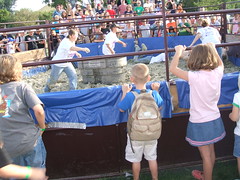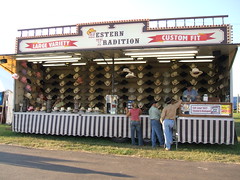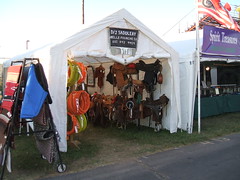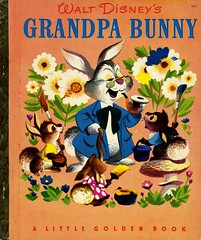Summer’s all but over and the mall is full of winter clothes, which only means one thing – FOOTBALL! This post goes in my “somebody-please-try-this-because-I-don’t-have-a-library” category. Oh, wait, I don’t have categories either, since this is a “Blogger” blog (but the new Blogger, when it moves from beta, will have labels/categories). Anyway . . .
Football season is a great opportunity for libraries to offer service to what my friend and colleague Donovan calls an “underserved population” – men. I bet men or young adults have no idea what the library could have to enhance their enjoyment of the football season. Here are a few of the ideas I used when I was in a library, what I’ve seen my libraries do here in Minnesota, or some crazy ideas I’ve just dreamed up. (I won’t tell you which is which).
- Displays – a search in the library’s online catalog will bring up all the books and movies with “football” in the subject headings. Incidentally, don’t forget baseball during the World Series this fall, or the European “football” – soccer.
- Buy some new football books. Check out all the fun titles at Amazon
- Host a library sponsored Fantasy Football League. You can set it up free on Yahoo Sports. http://football.fantasysports.yahoo.com/ You can probably find a volunteer to be the Commissioner (set up a league for the library). Have a draft party, then post standings during the season. You have to hurry on this one, before the season starts.
- Become the sports authority. Build a webliography of stats sources like the Super Bowl History site. Display the Sports Almanac prominently.
- Have a gameday tailgaters’ cookoff – proclaim a winner.
- Sponsor a Football 101 class for how to watch the game.
- Host gameday events – especially Monday nights. This year Monday Night Football will be broadcast on ESPN, which means that you will have to have cable or satellite to watch it. Not good for families who only have local TV. Here’s another chance for the community library to be a bridge over the digital divide. If you can’t do it every Monday night, do it when the local favorite is playing. schedule of all NFL games
And now, I’ll go re-read When Pride Still Mattered: a Life of Vince Lombardi, watch Remember the Titans for the hundredth time, and polish my cheesehead.






